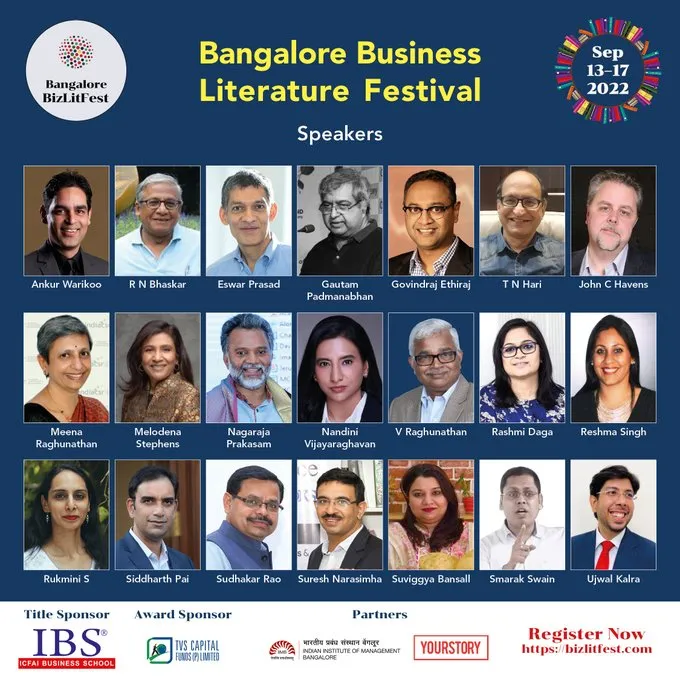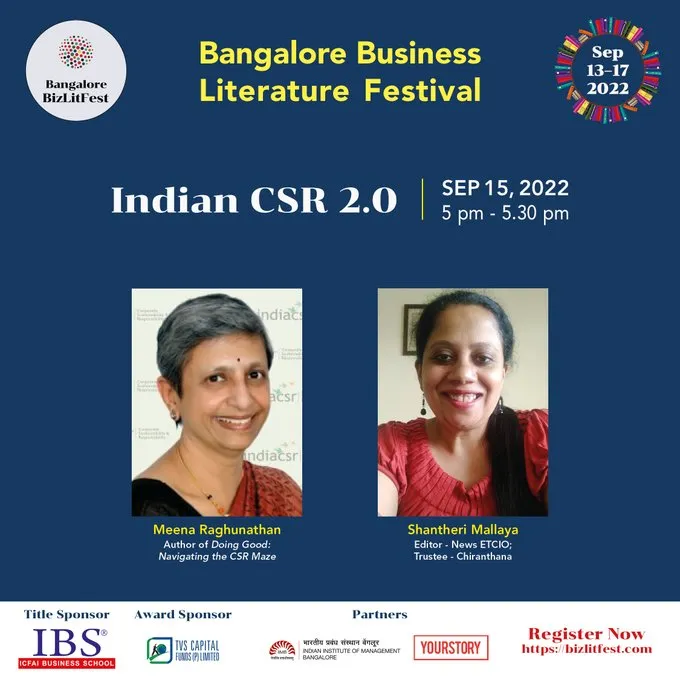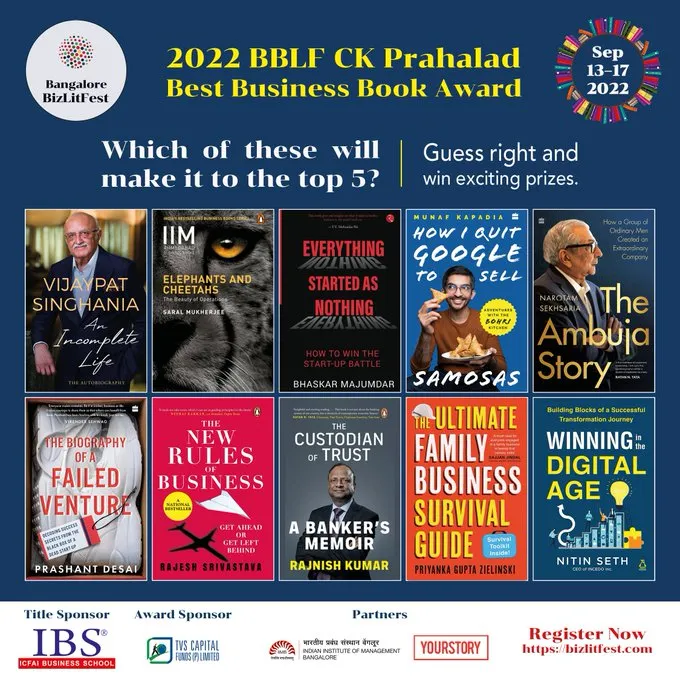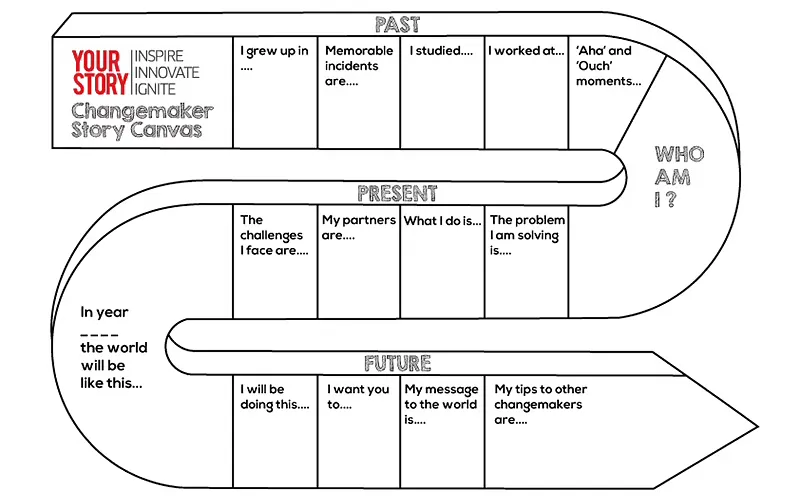Social contribution, environmental impact, effective governance–author Meena Raghunathan on the power of CSR
Meena Raghunathan is the author of the CSR book, ‘Doing Good.’ She is also speaking at BBLF 2022–here are some of her insights in this preview article.
Meena Raghunathan is the author of Doing Good: Navigating the CSR Maze in India, and visiting faculty at the MYRA School of Business.
She is also speaking at the upcoming Bangalore Business Literature Festival (BBLF) 2022 to be held on 13-17 September, for which YourStory is the media partner. See our earlier annual articles on BBLF from the 2015 edition onwards here, and our compilation of 85 Quotes on World Book Day.
A graduate of the University of Jodhpur and Miranda House, Meena has over 35 years of experience around ESG (environmental, social, corporate governance) themes. She set up and headed CSR for the GMR Group, and serves on the boards of Vikram Sarabhai Community Science Centre, Centre for Sustainable Development, and The Association for the Mentally Challenged.
See also YourStory’s Book Review section with takeaways from over 340 titles on creativity, entrepreneurship, innovation, social enterprise, and digital transformation.
In this interview, Meena shares insights on CSR initiatives and impacts in India, media coverage, and even book reading habits.
Edited excerpts from the interview:

YourStory [YS]: How do print/digital books compare with shortform web and video content these days? Can the two co-exist, or do you see books dwindling in market share and mindshare?
Meena Raghunathan [MR]: I think books will always have their place. Video and web content is kind of one-way and passive. When I read a book, I stop, think, ponder, and wonder. I look up a word, a concept, an idea, or whatever is triggered by what I was reading, and I come back to the book.
These other media don’t allow me to do that. And to get to grips with something, I would rather read a 300-page book than watch a long video. I feel that a book is generally the result of more scholarship.
Having said that, I am a big listener of podcasts. They are great for when I walk or cycle.
So while I don’t think books will lose their importance, there will be other media. Rather than seeing them as competing, we probably need to figure out how they are complementary, and use each medium for what it is best for.
[YS]: How effectively are India's social and environmental challenges being tackled by CSR initiatives? What gaps still remain, and how can they be overcome?
[MR]: CSR can definitely contribute its bit to India's social and environmental challenges, but cannot effectively solve the problems which are way too large, systemic and structural.
CSR can innovate and create models for new solutions and partnerships. It can deliver solutions effectively and provide last mile connectivity for delivery of services.
Corporate contribution to solutions to social and environmental challenges would be deeper when they truly internalise the Triple Bottom Line and thinking on responsible business—that is, taking into account social and environmental concerns as a core part of their business decision making. It is not about how profits are spent (which is CSR), but rather, how profits are made.

[YS]: How well are CSR initiatives being reported by Indian media, and what are some areas for improvement?
[MR]: I think there is space for more reportage in popular and business media (but everyone feels that about their pet- causes, right?).
Rather than event-based reporting or reporting when CSR awards are given out, maybe interviews of business leaders could all routinely have a question about the company’s CSR and how it is a part of business strategy. In India, we don’t often see views on CSR from academia—maybe that could be increased.
And real-life stories of both field level workers and communities—these have the power to share realities of India, and move people.
[YS]: As we emerge from the pandemic era, what are some key trends you notice in the topics and formats of books these days?
[MR]: What is amazing is the increasing variety, depth and width of Indian writing, whether fiction or non-fiction. Of course, I see the trend towards ‘self-help’ books increasing with the pandemic.
In the area of children’s books also, contemporary themes, wonderful visualisation and illustrations, and also new platforms. Which is the hope that the reading habit won’t die!
[YS]: How difficult is it for companies to operationally execute on CSR these days? Are Indian government regulations easier to navigate now?
[MR]: On the one hand, the understanding and processes for CSR and operations is now well developed after almost eight years, so to that extent it is easier.
Also, the ecosystem has developed, and there are both support agencies for various steps in operations, as well as good NGO implementing partners who are proving that they can deliver.
However, I think the compliances are pretty complex to negotiate. And it is not getting easier. The consequences for non-compliance are quite stringent. So sometimes the focus shifts to ‘spend the mandatory amount by 31 March, come what may.’ And the reporting requirements are pretty onerous too.
[YS]: How should social entrepreneurs make an effective pitch for CSR funds?
[MR]: This is a fairly grey area. To begin with, the only entities which can implement CSR are those structured as: a registered public trust, a registered society, a company established under Section 8 of the Companies Act, 2013, or any entity established under an Act of Parliament or a state legislature.
So unless a social enterprise is structured as one of these, it can directly implement CSR. Moreover, social entrepreneurship does not figure as one of the allowed CSR areas under Schedule VII which details out what counts as CSR. So some structuring will be required.
But there is a lot of space for partnerships and synergies, as social enterprises are coming out with innovative products and ways of doing things. It is up to the company and the social enterprise to work out the best way—maybe through the intermediation of a non-profit.

[YS]: There has been criticism that some CSR is mere PR or greenwashing. How can society ensure they stick to the right path with the right intent?
[MR]: Well, the law has made it more difficult for larger companies who fall under the mandate to not undertake the activities they claim.
But this will always remain a problem, and some companies would definitely either like to claim credit for changes they did not seriously contribute to, or to puff up ‘good activities’ to draw attention away from the bad ones. Civil society and media have a role in this.
Today, information is transparent. CSR information, sustainability reports and ESG reports are all publicly available, and anyone can challenge wrong claims.
[YS]: What are some notable examples you have come across of effective CSR in India?
[MR]: Well, I suppose Tata Group CSR will always be the inspiration for all of us. But since those are much-discussed, I won’t really go into them.
The work of the Srinvisan Services Trust, the social arm of TVS Motors and Sundaram Clayton is very deeply rooted in the community. Their focus is holistic rural development, and they have been working for over 25 years. They work in about 2,500 villages and have touched over 1.6 million people. Their true understanding of development can be gauged from the line on their site: ‘Our model of sustainable development takes years to implement.’
Ambuja Cements Foundation has a very rigorous approach to monitoring and research. They have spent a lot of time and thought in what to monitor and how to monitor, and it is embedded into each initiative. They generate a lot of information and their knowledge management system is well laid out to be able to garner insights from this. So the programmes can be on a continuous improvement mode and one is sure of impacts.
The HCL Foundation, HCL’s CSR arm is notable for its grants programme. It supports breakthrough and highly impactful projects undertaken by NGOs working in environment, health, and education. Apart from the fact that it funds selected NGOs for large projects, I feel that the rigorous seven-step selection process used is very useful for applicants to gauge themselves on their governance, processes, impacts etc., and to strengthen themselves. This is a long-term contribution to the CSR ecosystem.
And of course I would like to mention the skill training programs of GMR Varalakhsmi Foundaton, which started in 2004. We were pioneers in partnerships with corporates which led to the enhancement of training quality, as well as on a very process driven approach, which helps in quick scale up with quality.

[YS]: How does CSR in India compare to other countries, in terms of adoption and impact?
[MR]: Well, the law has made it mandatory for over 23,000 companies to undertake CSR. Pre-pandemic, the amounts spent were steadily rising. Almost all the companies that fell under the mandate had taken up CSR. So I would say that probably adoption is very high compared to other countries.
The impact is a more complex issue. Many individual CSR programmes are very well structured and show good impact in the area of their operations. Other companies are still learning. But what that adds up to in the context of our SDGs or the Human Development Index is much more difficult to comment on.
[YS]: How was your book received, and how do you continue to engage with audiences after publication?
[MR]: Well, the book just got released on 22 August. People who are hearing about it are excited. And the comments that have started coming in on the sites seem generally favourable. So I hope it does well!
I have done a few print interviews and a series of webcast-interviews on the book for the National Skills Network, and am speaking at a few forums. Some sites have put up excerpts from the book. The Bangalore Bizlit Festival fireside chat is a great opportunity too.
[YS]: What are some books on your reading list these days?
[MR]: I am reading a beautifully illustrated volume of Japenese Folk Tales, and a book of short stories by Manto.
Waiting for me to finish these is Nikhil Menon’s Planned Democracy. It is about how India’s planning process was underpinned by amazing systems of collecting data and statistics, and how the planning process was part of the democratic exercise.
And just to go back to blended reading, I got the book. But I am inspired to read it now, after listening to a Bangalore International Centre podcast on it!

[YS]: What are your words of advice or tips for the aspiring writers in our audience?
[MR]: Well, writing is a lot about patience and discipline. One of my bosses used to tell us that the most important thing before setting out on writing was to be very clear on the following:
• The Title and Sub-title: that helps to focus on what the book is about.
• The Table of Contents: that clarifies what gets into the book, and what does not.
I find this helps a lot.
One way to approach non-fiction might even be to do it like FAQs. List all the questions that you would like the book to answer. Then sequence them and group them into logical chapters. Then answer them!



![[Year in Review 2021] Meet the businesswomen who made headlines this year](https://images.yourstory.com/cs/4/bf6cd6001f6d11ec9f7c8d775ba8e1d7/CopyofImageTagsEditorialTeamPoorvi-1639541557400.jpg?fm=png&auto=format&h=100&w=100&crop=entropy&fit=crop)
![[Year in Review 2021] Amid COVID-19, these 10 non-profits created social impact this year](https://images.yourstory.com/cs/5/79900dd0d91311e8a16045a90309d734/collage-1640102486726.png?fm=png&auto=format&h=100&w=100&crop=entropy&fit=crop)
![[Year in Review] Meet these Indian women who used social media to drive change and social impact](https://images.yourstory.com/cs/4/211ccaf00e6d11e997fe8f165dce9bb1/NewDesigncopy14-1640700625660.png?fm=png&auto=format&h=100&w=100&crop=entropy&fit=crop)




